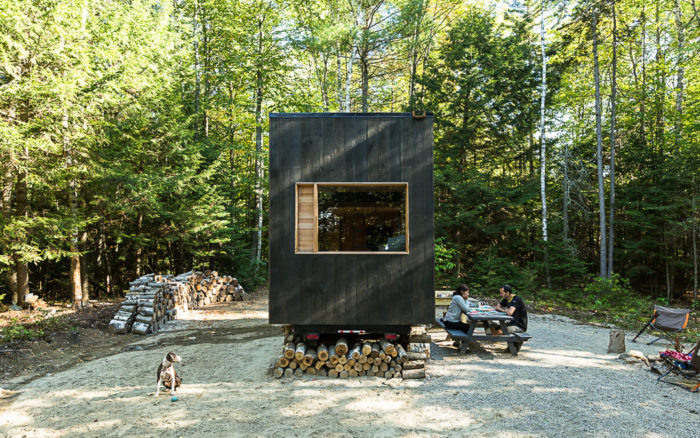
A pair of Harvard entrepreneurs is putting a new twist on a very old idea: spending a few days in the woods is good for what ails you.
But rather than recommending tent space at a state campground, or a slot at an RV park, Getaway suggests renting one of its tiny houses within a two-hour drive of a major urban center.
The company is the invention of two Harvard grads, Pete Davis and Jon Staff. They hope to capitalize on a need to unplug and unwind that many stressed urbanites may be feeling these days. Cell phones go in a lock box, and the digital intrusions of modern life recede into the background.
A Washington Post story describing their fledgling business says that Getaway now has a total of 80 tiny houses in three locations — within an easy drive of Washington, Boston, and New York. Los Angeles is the next target, and the company eventually would like to establish outposts near every big U.S. city and possibly abroad.
The 20-foot by 8-foot cabins are grouped on woodlands Getaway has under long-term leases, The Post said. Once you make your reservation, you’ll get directions and an electronic code needed for entry. Each cabin has a queen-sized bed (cabins for four people have two beds and are sometimes lofted), a hot shower and toilet, an electric heater, a two-burner stove, and basic kitchen supplies. Renters are encouraged not to bring too much.
Rates are between $100 and $200 per night. A one-night stay over a Friday night at the Boston area outpost (located in Epson, New Hampshire) in mid-December, for example, was $189. A midweek reservation was $99.
The lock box for cell phones is central to the idea.
“Because of the secluded nature of our outposts, cell phone service may be a little spottier than normal,” the website says. “You may not get any reception at all — if this is the case, embrace the opportunity to unplug and relax. Each of the cabins is equipped with a landline for calls to the Getaway team or to 911 in case of emergency. There is no WiFi and never will be.”
Marketing appears to be geared toward people who haven’t spent much time camping and may not have the equipment or the confidence to enjoy essentially the same experience on their own. One video posted on the website, for example, features a Buzzfeed staffer who is coaxed into trying a cabin by a colleague. He is initially terrified to learn he will be spending time alone in a cabin in the woods, but by morning comes around to enthusiastically embrace the experience.
“We want Getaway to be the opposite of Silicon Valley,” Davis told The Post. “Silicon Valley sells you more connection and more distraction. We want Getaway to be about disconnection, deep conversation, a real-life recharge.”
The tiny houses are made for about $30,000 each in Massachusetts and trucked to the site. Davis and Staff started the venture by finding the New Hampshire site on Craigslist, and moved the first cabin there in 2015. Getaway got a $15 million cash infusion last year from L Catterton, a venture capital fund that specializes in companies that emphasize quality of life, The Post said.
Cabins have 150-gallon tanks for fresh water, which the company says should be enough for four nights if guests are “thoughtful” about their consumption. It’s not clear whether the cabin bathrooms are connected to some kind of on-site septic system or simply equipped with a holding tank. The company didn’t respond to an email for more information.
Weekly Newsletter
Get building science and energy efficiency advice, plus special offers, in your inbox.














4 Comments
Apart from branding these Tiny Homes, how are they different from any other small cabin rentals?
Thats basically it, its about branding an experience in the woods and being more comfortable them camping in a tent.
Several years ago the number of campers in our parks here in Canada started to decline. One of the reason cited was that Millennials didn't want to be out of wireless range, and identified as one of their worst fears being by themselves in the wilderness. I guess these huts are a form of therapy.
Shock therapy apparently.
Electronic devices are nice but spending time with people and nature is also nice, though its a joy many seem to have yet to discover.
Log in or create an account to post a comment.
Sign up Log in